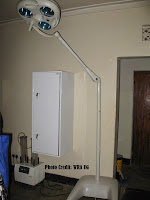Patrick Ogwang
WRA Uganda (WRA Lira District Media Coordinator)
 |
Tommy Ojan Egits presenting the petition at Amach Sub-county headquarters
during Lira District World AIDS Day commemoration |
White Ribbon alliance Lira in collaboration
with residents from the two sub county of Ogur and Amach petitioned Lira District
Local Government to allocate a budget in the financial year 2014-2015 to
support Emergency obstetric and newborn care services at health center s III
and IV. The petition signed by over 1000 community members was presented to the
District Council through the District Speaker.
While handing over the petition to
the district leaders at the commemoration of World Aids Day district event at
Amach sub county headquarter, Tommy Ojan Egit who is a WRA Lira member and
newly elected representative at the WRA Uganda board said that the petition
followed an assessment by White Ribbon Alliance, leaders and community members carried
out in all the health facilities at level of III and IV in Lira with the
indicator that none of the two HC IVs is able to provide comprehensive
emergency obstetric and newborn care services due to theater functionality
issues.
Ojan further stressed that
shortage of running water, power and non-functional theaters at Ogur and Amach
HC IVs, stock-outs of injectable drugs for basic obstetric complications,
inadequate resuscitation devices, lack of blood pressure machines and
incomplete delivery instruments among others has put the lives of pregnant
women and their newborns at risk since most of them are referred to the main
regional referral hospital which is far away from them.
 |
Tommy Ojan Egits handing-over EmONC petition to Lira District
Vice Chairperson at Amach Sub-county headquarters |
Mr. Andrew Ogwang Oyang the
District Vice Chairman and the leader of government while receiving the
petition on behalf of the District Speaker and the council thanked The White
Ribbon Alliance for their effort of carrying out an assessment saying it has
helped a lot the district to get documented information for planning. The
Chairperson promised to handle the petition with urgency it deserves so that
the issues raised are considered in the district budget.
Subsequently, on 6th
December 2013, The White Ribbon Alliance members held a meeting with the
members of the district committee for health and education to further advocate
for prioritization of emergency obstetric care services in the district budget.
Mr. Moses Ogwang Adonyo the Chairperson of health and education committee said that
his committee will make sure the report findings are brought to council for
further scrutiny and approval so that a budget is allocated in the financial
year 2014-2015.
 |
| WRA Lira and community members march during World AIDS Day commemoration event at Amach Sub-county headquarters, Lira district before presenting their petition |



.jpg)

















.jpg)